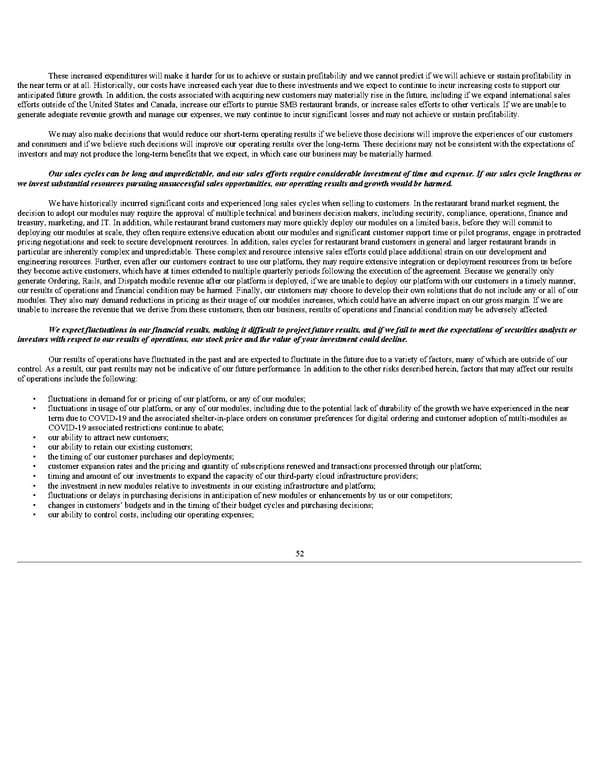These increased expenditures will make it harder for us to achieve or sustain profitability and we cannot predict if we will achieve or sustain profitability in the near term or at all. Historically, our costs have increased each year due to these investments and we expect to continue to incur increasing costs to support our anticipated future growth. In addition, the costs associated with acquiring new customers may materially rise in the future, including if we expand international sales efforts outside of the United States and Canada, increase our efforts to pursue SMB restaurant brands, or increase sales efforts to other verticals. If we are unable to generate adequate revenue growth and manage our expenses, we may continue to incur significant losses and may not achieve or sustain profitability. We may also make decisions that would reduce our short-term operating results if we believe those decisions will improve the experiences of our customers and consumers and if we believe such decisions will improve our operating results over the long-term. These decisions may not be consistent with the expectations of investors and may not produce the long-term benefits that we expect, in which case our business may be materially harmed. Our sales cycles can be long and unpredictable, and our sales efforts require considerable investment of time and expense. If our sales cycle lengthens or we invest substantial resources pursuing unsuccessful sales opportunities, our operating results and growth would be harmed. We have historically incurred significant costs and experienced long sales cycles when selling to customers. In the restaurant brand market segment, the decision to adopt our modules may require the approval of multiple technical and business decision makers, including security, compliance, operations, finance and treasury, marketing, and IT. In addition, while restaurant brand customers may more quickly deploy our modules on a limited basis, before they will commit to deploying our modules at scale, they often require extensive education about our modules and significant customer support time or pilot programs, engage in protracted pricing negotiations and seek to secure development resources. In addition, sales cycles for restaurant brand customers in general and larger restaurant brands in particular are inherently complex and unpredictable. These complex and resource intensive sales efforts could place additional strain on our development and engineering resources. Further, even after our customers contract to use our platform, they may require extensive integration or deployment resources from us before they become active customers, which have at times extended to multiple quarterly periods following the execution of the agreement. Because we generally only generate Ordering, Rails, and Dispatch module revenue after our platform is deployed, if we are unable to deploy our platform with our customers in a timely manner, our results of operations and financial condition may be harmed. Finally, our customers may choose to develop their own solutions that do not include any or all of our modules. They also may demand reductions in pricing as their usage of our modules increases, which could have an adverse impact on our gross margin. If we are unable to increase the revenue that we derive from these customers, then our business, results of operations and financial condition may be adversely affected. We expect fluctuations in our financial results, making it difficult to project future results, and if we fail to meet the expectations of securities analysts or investors with respect to our results of operations, our stock price and the value of your investment could decline. Our results of operations have fluctuated in the past and are expected to fluctuate in the future due to a variety of factors, many of which are outside of our control. As a result, our past results may not be indicative of our future performance. In addition to the other risks described herein, factors that may affect our results of operations include the following: • fluctuations in demand for or pricing of our platform, or any of our modules; • fluctuations in usage of our platform, or any of our modules, including due to the potential lack of durability of the growth we have experienced in the near term due to COVID-19 and the associated shelter-in-place orders on consumer preferences for digital ordering and customer adoption of multi-modules as COVID-19 associated restrictions continue to abate; • our ability to attract new customers; • our ability to retain our existing customers; • the timing of our customer purchases and deployments; • customer expansion rates and the pricing and quantity of subscriptions renewed and transactions processed through our platform; • timing and amount of our investments to expand the capacity of our third-party cloud infrastructure providers; • the investment in new modules relative to investments in our existing infrastructure and platform; • fluctuations or delays in purchasing decisions in anticipation of new modules or enhancements by us or our competitors; • changes in customers’ budgets and in the timing of their budget cycles and purchasing decisions; • our ability to control costs, including our operating expenses; 52
 Q3 2021 10Q Page 57 Page 59
Q3 2021 10Q Page 57 Page 59